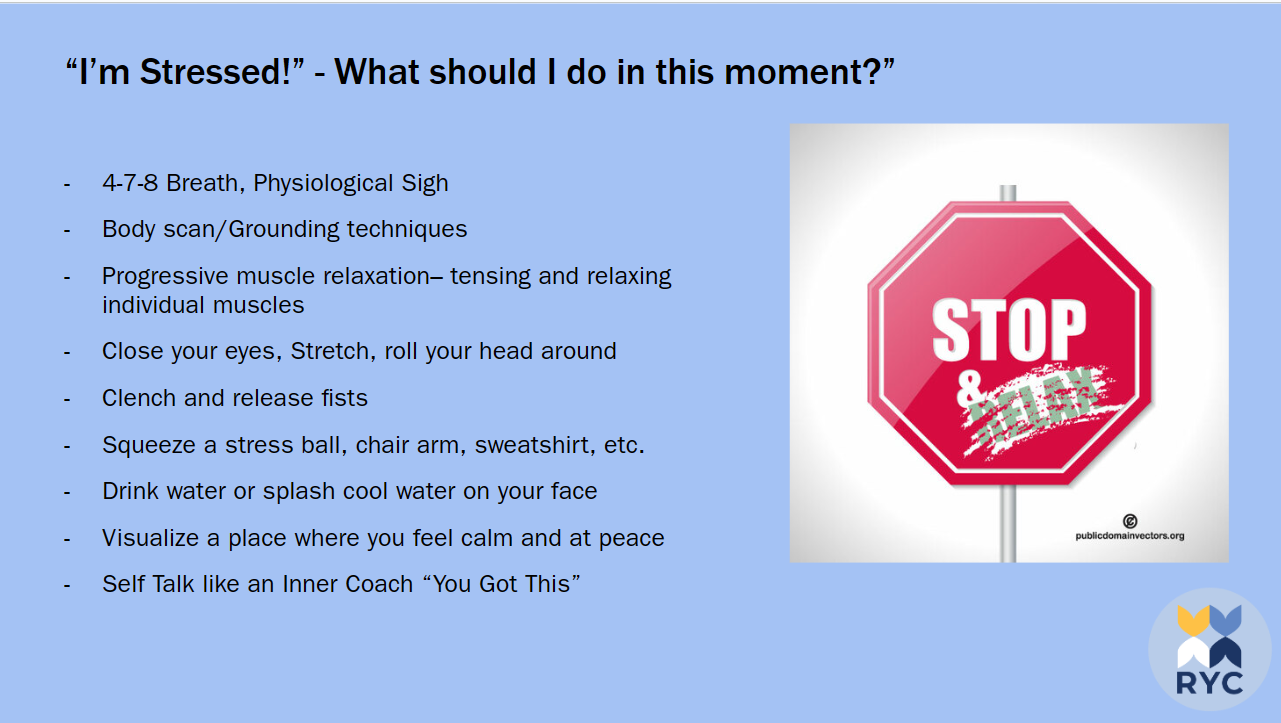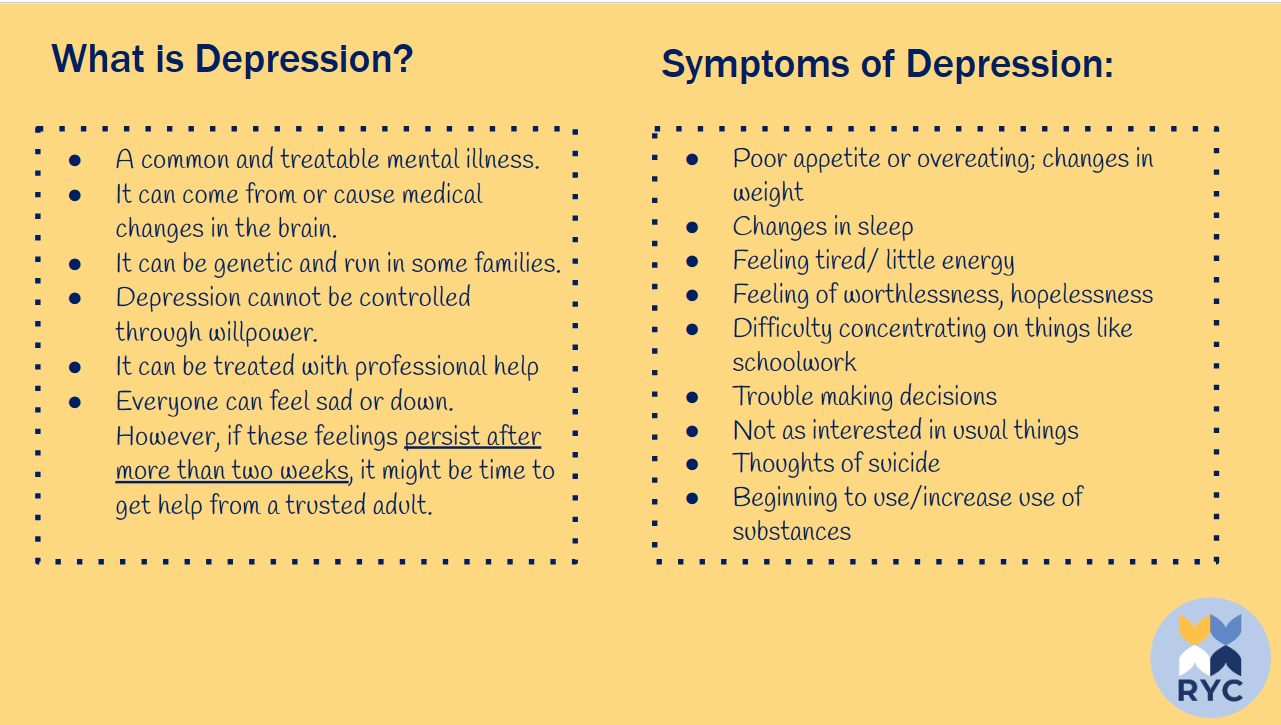
Student-Athlete Mental Health
Breathwork to Calm or Activate Your Nervous System
Sangeeta Bansall, Ph.D.,Rye Youth Council Director of Wellness and Youth Empowerment demonstrates breathwork techniques that can be used in a variety of situations to calm or activate a person's nervous system.
Local Mental Health Resources
*Always tell a trusted adult or call 911 if anyone you know mentions thoughts of suicide*
National Suicide and Crisis Lifeline: 9-8-8 (text or call)
Westchester County Crisis Prevention & Response Line (914) 925- 5959
Rye Youth Council Restore (Youth Counseling Services for youth ages 5-22): (914) 222-0988
RYC RESTORE Confidential Email: restore@ryeyouthcouncil.org
The Trevor Project (LGBTQ+): 1-866-488-7386
Rye High School Psychologists: Dr. Robert Schechter | email: schechter.robert@ryeschools.org and Ms. Rosie Smith | email: smith.rosie@ryeschools.org
Rye High School Social Worker: Ms. Sandy Degenhardt | email: degenhardt.sandy@ryeschools.org
Westchester County Office of Mental Health Online Resource Directory
Youth Mental Health Statistics
1 in 4 teens lives with a diagnosable mental health condition
50% of all mental illnesses begin by age 14, 75% by age 24
15% of youth experienced a major depressive episode this past year
54% of youth with major depression do not receive any mental health treatment
42% of high school athletes struggle with some form of disordered eating
Student-athletes are estimated to experience mental health challenges at higher rates than non athletes due to factors associated with balancing sports, school, family, and social life
Student-athletes are also statistically less likely to reach out and ask for help when experiencing a mental health challenge, largely as a result of stigma surrounding the conversation of mental health and the culture of toughness within athletics
Depression is the leading cause of disability in the U.S
Athletes commonly experience injuries such as sprains, tears, and fractures… how are these ailments viewed differently from mental health challenges?
Top 12 Takeaways for Student Athletes
Top 12 Takeaways:
Mental health is a key component of physical and mental wellness.
Mental health challenges impede athletic performance and overall quality of life.
Team culture plays a large role in how mental health challenges are discussed and navigated.
Supporting your teammates’ mental well-being and honoring your own will increase team performance and cohesion.
Use of substances (Alcohol, Nicotine, Marijuana, and other Drugs) can hinder athletic performance, lead to mental health challenges, or worsen existing mental health challenges.
Getting into a routine that encourages wellness can improve quality of life and athletic performance.
There are many self-soothing strategies to navigate stress and negative emotions or thoughts.
Reframing your mindset to positive psychology and positive self-talk can help performance and enhance a love for the game.
Many elite athletes are calling attention to the need to prioritize mental wellness to reach their full potential as a person and an athlete.
Half of individuals who will experience a mental health challenge in their lifetime will experience one by the age of 14
The sooner an individual seeks treatment for a mental health challenge, the better the outcome
Experiencing a mental health challenge is increasingly common; there is no shame in taking the time and effort to figure out what you need to succeed and honor those needs. Help helps!
How Stress and Anxiety Affect the Body
Everyone has anxiety from time to time, but chronic anxiety can interfere with your quality of life. While perhaps most recognized for behavioral changes, anxiety can also have serious consequences on your physical health.
Read this article for an excellent visual and more information: 12 Effects of Anxiety on the Body (healthline.com)
Self-soothing Techniques
Find a quiet space where you can sit or lie down, if possible (or your favorite spot in a familiar building)
Close your eyes
Breath in through your nose for 5 seconds, hold your breath for 5 seconds, slowly breathe out of your mouth for 5 seconds, and let the “bad” air leave your body; repeat until breathing has returned to normal
Recognize 5 things you can see, 4 things you can feel, 3 things you can hear, 2 things you can smell, and 1 thing you can taste in your environment to ground yourself
Drink water or splash cool water on your face; or take a cold shower
Find clothing, blankets, textures, etc. that are comforting and surround yourself with me or a sentimental object
Progressive muscle relaxation– tensing and relaxing individual muscles
Stretch, roll head around
Clench and release fists
Squeeze a stress ball, chair arm, sweatshirt, etc.
Push your heels into the ground and notice your connection to the floor
Place a cool washcloth on your face
Spend time with or walk a pet
Listen to a calm music (whatever that means to you)
It may take time to find the right soothing activity that works for you, and you may utilize different tools in different situations; be patient with yourself as you discover what works best for you
Think of these options as a menu– choose 1 to 2 to try for the next 2 weeks and reflect on how you feel afterward
Athletes Who Champion the Importance of Mental Health and Wellness
Simone Biles Speaks Out on Championing Mental Health
Kevin Love Details His Struggles With Mental Illness
Starting the Conversation: SF Giants Drew Robinson on Suicide
Michael Phelps Shares his Experience with Mental Health
Lindsey Vonn on Mental Health: Self-Discovery and the Winter Games
“We are so grateful to have RYC as a resource in our community. Our student-athletes have benefited greatly due to their presence in our school community. Specifically, our student-athlete mental health sessions have created an environment where students can reflect, be vulnerable, and learn how to be supportive teammates. We are thankful to have such great conversation surrounding the challenges our students face, and the opportunity to grow together as a Garnet community; due to Rye Youth Council’s partnership.”
Susan Reid Dullea, Rye HS Athletic Director









